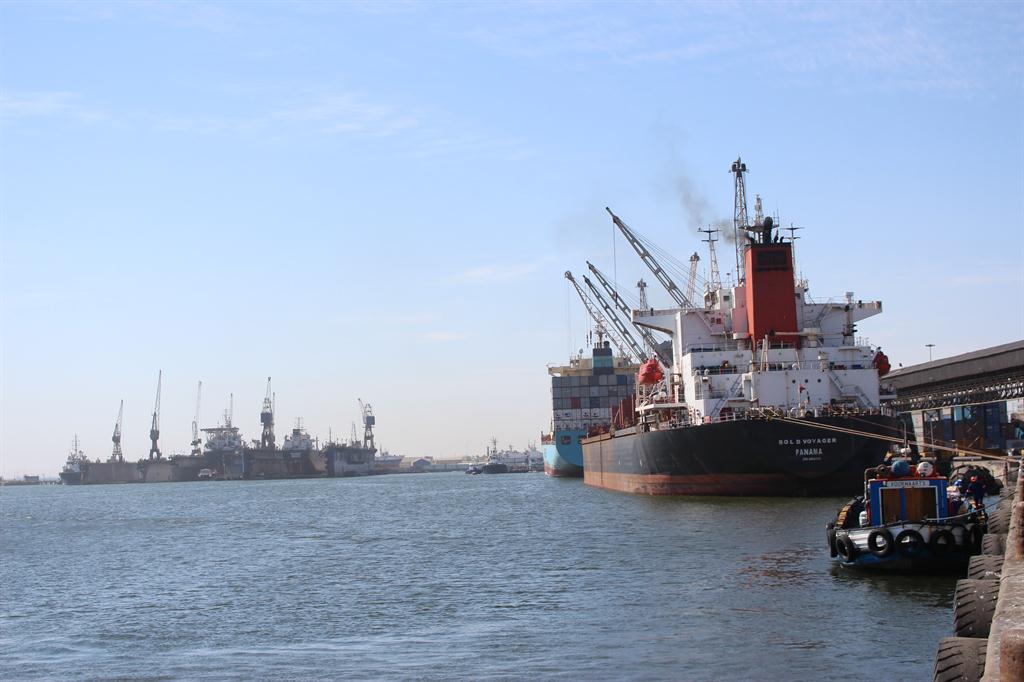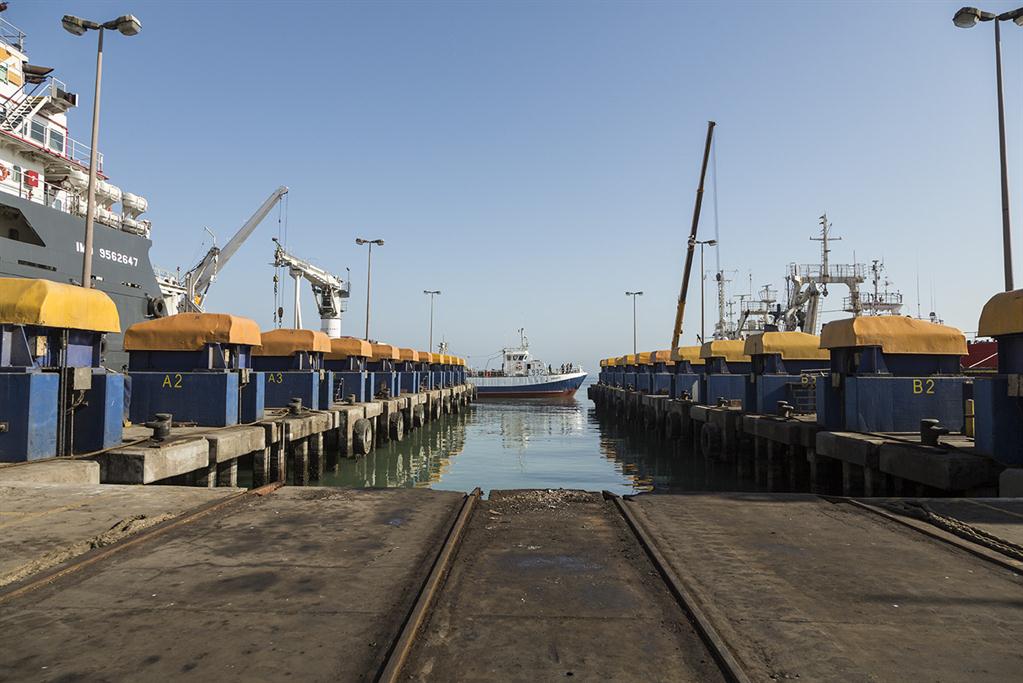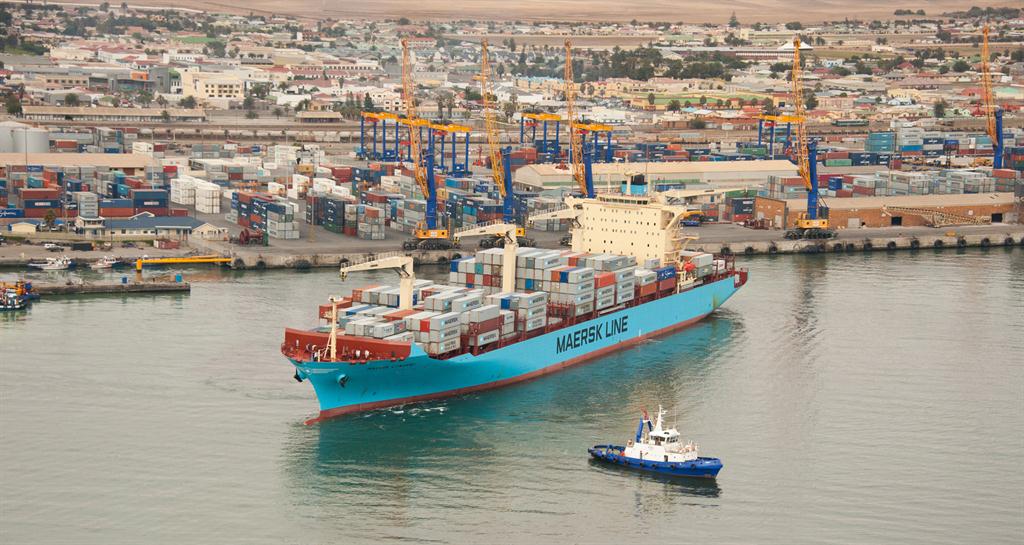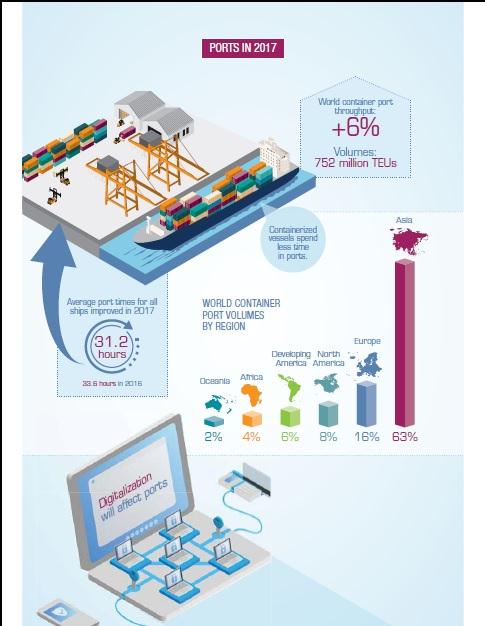Maritime trade and Africa
Demographic growth and regional integration can nurture Africa’s maritime trade.
Geneva, Switzerland - The United Nations Conference on Trade and Development (UNCTAD) released its review of global maritime transport for 2017 early in October 2018.
In regards to maritime trade and Africa, UNCTAD’s review found that Africa relies heavily on ships and ports to service its intercontinental trade.
While it accounts for approximately 2.7% of global trade by value, the continent contributes higher shares to global seaborne trade – 7% and 5% of maritime exports and imports by volume, respectively.
SMALL PART, BIG PROMISE
?Africa’s minimal integration in world trade is reflected in its maritime sector, says the UN body for trade promotion. According to UNCTAD this is an enormous opportunity for the world’s second-most populous continent.
While one-third of African countries are landlocked, maritime transport remains the main gateway to the global marketplace. Of total maritime trade in Africa 40% of goods exported by sea in 2017 comprised of crude oil, while over two-thirds of imports were accounted for by dry cargoes such as dry bulks and containerized goods, and close to 20% of imports were made up of petroleum products and gas.
The European Union remains Africa’s major trading partner although its share of trade has declined from about half in 1995 to one-third in 2017. In recent years, the share of trade with the United States of America has fallen while trade with China has increased. This is opening new opportunities for the continent both as a consumer market as well as a potential manufacturing region, as shown by growing textile and garment manufacturing activity in Ethiopia, for example.
Africa’s ports account for 4% of global containerized trade volume, much of which comprises imports of manufactured goods. Africa’s shipping and ports do not always match global trends and standards. Apart from four container terminals in Morocco, Egypt and South Africa, no other African port was featured in the 2016 list of Top 100 global container ports.
GETTING BETTER
By diversifying economies and enabling greater integration into regional and global value chains, Africa can improve its containerized trade and port traffic volumes. For this to happen, however, trade policy and regional integration initiatives such as the African Continental Free Trade Agreement (AfCFTA) will not be enough, says UNCTAD.
Africa’s container ports and hinterland transport networks need to support these efforts by upgrading infrastructure and services, and improving performance, to match international standards. This entails, among other things, enhancing productivity levels: On average, crane productivity is around 20 moves per crane per hour in West Africa, 25 to 30 in South Africa, and 35 to 40 in Asia.
Shipping connectivity, which significantly influences transport cost levels, is below the global average in Africa. African countries shipping connectivity is strongly influenced by their geography. The best-connected countries are those at the continent’s corners, where international shipping routes connect to hub ports, notably in Morocco, Egypt and South Africa. They are followed by sub-regional load centres, notably Djibouti, Togo and Mauritius.
Combinations of public and private investments, port reforms, and improved transit to connect to neighbouring landlocked countries have helped these countries to become leaders in African container shipping connectivity, according to UNCTAD.
Africa has for many years sought to increase its participation in the supply of shipping services. This has yet to be achieved as the continent’s ownership of the world fleet is limited, with no African country among the Top 35 ship-owning nations in 2017. This is also evident when considering nationally flagged fleets. Only Liberia makes the list of top flag States, ranking third globally after Panama and Marshall Islands regarding nationally flagged tonnage.
DORMANT GIANT
Several factors on the upside suggest that Africa is a dormant giant, including robust economic growth, a demographic dividend, resources, growing investment and financing commitments relating to transport infrastructure, including by China.
UNCTAD supports Africa in these endeavours with several flagship programmes. These include port management, trade facilitation and sustainable freight transport technical assistance programmes, as well as close collaboration with the African Union towards achieving the African Free Trade Area. UNCTAD also actively supports customs reforms in most African countries.
National, regional and international players need to prepare African ports to accommodate larger vessels through dredging for depth, and ensuring adequate cargo handling equipment is in place. Access to the hinterland and landlocked countries must improve through multimodal transport transport-corridor approaches, and building inland transport infrastructure.
Relevant technologies and digital solutions must be used to facilitate transport and trade, cut inefficiencies, improve processes and enhance transparency, while promoting security and resilience of transport systems. Harmonizing transport regulation, including road and rail transport, encourages greater participation in maritime business, UNCTAD says. - UNCTAD
In regards to maritime trade and Africa, UNCTAD’s review found that Africa relies heavily on ships and ports to service its intercontinental trade.
While it accounts for approximately 2.7% of global trade by value, the continent contributes higher shares to global seaborne trade – 7% and 5% of maritime exports and imports by volume, respectively.
SMALL PART, BIG PROMISE
?Africa’s minimal integration in world trade is reflected in its maritime sector, says the UN body for trade promotion. According to UNCTAD this is an enormous opportunity for the world’s second-most populous continent.
While one-third of African countries are landlocked, maritime transport remains the main gateway to the global marketplace. Of total maritime trade in Africa 40% of goods exported by sea in 2017 comprised of crude oil, while over two-thirds of imports were accounted for by dry cargoes such as dry bulks and containerized goods, and close to 20% of imports were made up of petroleum products and gas.
The European Union remains Africa’s major trading partner although its share of trade has declined from about half in 1995 to one-third in 2017. In recent years, the share of trade with the United States of America has fallen while trade with China has increased. This is opening new opportunities for the continent both as a consumer market as well as a potential manufacturing region, as shown by growing textile and garment manufacturing activity in Ethiopia, for example.
Africa’s ports account for 4% of global containerized trade volume, much of which comprises imports of manufactured goods. Africa’s shipping and ports do not always match global trends and standards. Apart from four container terminals in Morocco, Egypt and South Africa, no other African port was featured in the 2016 list of Top 100 global container ports.
GETTING BETTER
By diversifying economies and enabling greater integration into regional and global value chains, Africa can improve its containerized trade and port traffic volumes. For this to happen, however, trade policy and regional integration initiatives such as the African Continental Free Trade Agreement (AfCFTA) will not be enough, says UNCTAD.
Africa’s container ports and hinterland transport networks need to support these efforts by upgrading infrastructure and services, and improving performance, to match international standards. This entails, among other things, enhancing productivity levels: On average, crane productivity is around 20 moves per crane per hour in West Africa, 25 to 30 in South Africa, and 35 to 40 in Asia.
Shipping connectivity, which significantly influences transport cost levels, is below the global average in Africa. African countries shipping connectivity is strongly influenced by their geography. The best-connected countries are those at the continent’s corners, where international shipping routes connect to hub ports, notably in Morocco, Egypt and South Africa. They are followed by sub-regional load centres, notably Djibouti, Togo and Mauritius.
Combinations of public and private investments, port reforms, and improved transit to connect to neighbouring landlocked countries have helped these countries to become leaders in African container shipping connectivity, according to UNCTAD.
Africa has for many years sought to increase its participation in the supply of shipping services. This has yet to be achieved as the continent’s ownership of the world fleet is limited, with no African country among the Top 35 ship-owning nations in 2017. This is also evident when considering nationally flagged fleets. Only Liberia makes the list of top flag States, ranking third globally after Panama and Marshall Islands regarding nationally flagged tonnage.
DORMANT GIANT
Several factors on the upside suggest that Africa is a dormant giant, including robust economic growth, a demographic dividend, resources, growing investment and financing commitments relating to transport infrastructure, including by China.
UNCTAD supports Africa in these endeavours with several flagship programmes. These include port management, trade facilitation and sustainable freight transport technical assistance programmes, as well as close collaboration with the African Union towards achieving the African Free Trade Area. UNCTAD also actively supports customs reforms in most African countries.
National, regional and international players need to prepare African ports to accommodate larger vessels through dredging for depth, and ensuring adequate cargo handling equipment is in place. Access to the hinterland and landlocked countries must improve through multimodal transport transport-corridor approaches, and building inland transport infrastructure.
Relevant technologies and digital solutions must be used to facilitate transport and trade, cut inefficiencies, improve processes and enhance transparency, while promoting security and resilience of transport systems. Harmonizing transport regulation, including road and rail transport, encourages greater participation in maritime business, UNCTAD says. - UNCTAD







Kommentaar
Republikein
Geen kommentaar is op hierdie artikel gelaat nie